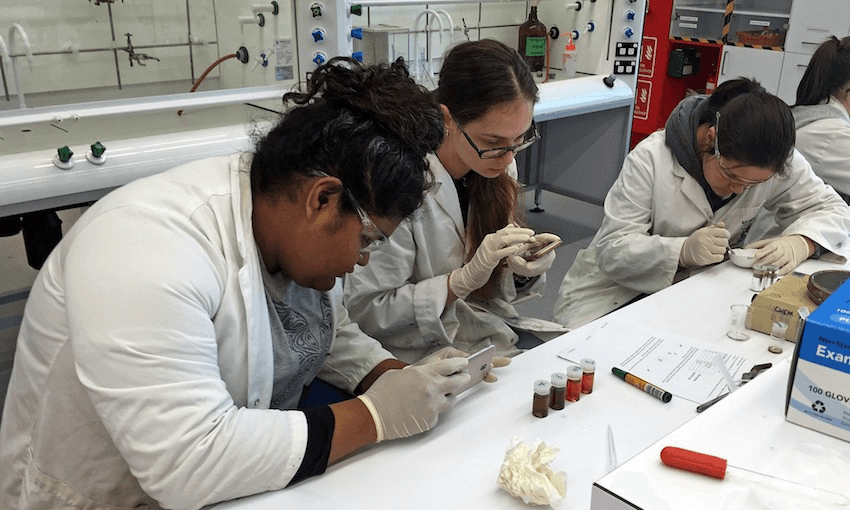DiscoveryCamp gives Māori and Pacific high school students the chance to experience science at a tertiary level. Alice Webb-Liddall finds out why it’s important to get these young people interested.
Māori and Pacific people have been experts in science for thousands of years. They navigated the earth using astronomy, grown food with biology and created medicines with botany. “This is and always has been science,” says Dr Ocean Mercier (Ngāti Porou). The Victoria University of Wellington lecturer has a PhD in condensed matter physics, and studies how mātauranga Māori and science connect.
“It’s an old fable that Māori and Pacific people aren’t suited to do science – that we’re more capable of arts or dance – but what people don’t seem to understand is that we have been scientists forever.”
But the representation of Māori and Pacific people in science is far below where it should be. While nearly a quarter of New Zealand’s population identify as Māori or Pasifika, a science review from 2010 found Māori and Pacific Islanders only make up around 2% of the scientific workforce.
To help increase this dismal statistic, the MacDiarmid Institute intervenes early: high school students. Their annual DiscoveryCamp programme gives young Māori and Pacific senior students the opportunity to learn from some of the best scientists at some of New Zealand’s top universities on an all-expenses-paid five-day science trip.
Mariah McDonald (Ngāi Tahu) attended DiscoveryCamp in 2013/14, and now she’s studying for her PhD in biomechanical engineering. For her, the experience at DiscoveryCamp cemented the idea that science was a viable post-high school route.
“During our tours of the university, we got to see people doing real hands-on work. Some of them were developing a better contraceptive pill and others were doing work for breast cancer… I got to see how what I was learning in school applied to the real world.”
In the time since McDonald left high school, she’s come to understand the extent of the representation problem. She believes programmes encouraging young people into science are extremely important to remedy this.
“Māori and Pasifika students are definitely underrepresented in STEM. The MacDiarmid Institute is creating an opportunity for this group that is underrepresented, to expose them to what’s out there, because for whatever reason we’re not being exposed to it.”
There’s no one thing to blame for this under-representation. But, the deep systemic disconnection of Māori from the sciences has had a real impact on students perception of the possibilities for their future. Growing up, Mercier didn’t feel as though science was connected to her identity as a Māori woman.
“It’s an endemic issue due to low representation of Māori and Pacific teachers in schools, which leads to low levels of uptake for the sciences. They don’t see other people doing science that look like them.”
This has seen big changes at the highest levels in an attempt to address the issue. The Ministry of Business, Innovation and Employment have created a ‘diversity statement’ to ensure New Zealand’s science workforce is more reflective of the country’s population. This statement includes objectives like showcasing a more diverse range of researchers, ensuring greater diversity in decision-making bodies and raising awareness of unconscious bias in the sector.
DiscoveryCamp 2013/14 alumnus Lizzie Tafili loved high school science. But it was DiscoveryCamp that affirmed her potential to study science at a tertiary level was actually possible. She went on to complete a science degree at Victoria University. While she loved the high school science curriculum, it was the DiscoveryCamp that affirmed her goal to study science at a tertiary level was a reasonable one. She says the way science is taught in schools doesn’t cover the possibilities of what a science degree can be.
“At school, I only knew about science leading you into being a doctor or a pharmacist or something, but going to DiscoveryCamp I saw that that was not properly advertised. I loved learning about how you can use research and science to help with issues that we’re facing now like climate change.”
Tafili is now working towards a certificate in social work in Whanganui, but she’s not done with science yet. She hopes one day she can marry her two passions.
“I am currently focused on community and youth work but at some point. I want to transition into making science accessible in an innovative and entrepreneurial way.”
Mercier wants to see more Māori and Pacific students endorsed to bring their world view to the laboratory. “It’s not that we don’t have an affinity for science, it’s that our science looks a bit different.”
She wants young Māori and Pacific students to acknowledge that their unique perspectives can help to shift the landscape towards a less European-centric dialogue.
“Science needs to be represented by the people it serves.”
If you or someone you know is in year 12 or 13 and has a passion for science, they can apply for the 2020 DiscoveryCamp here, and see how they can help to change the world. Applications open today 26 July and close 26 August.
This content was created in paid partnership with the MacDiarmid Institute. Learn more about our partnerships here

